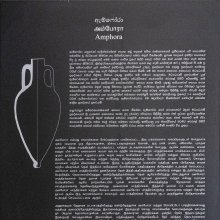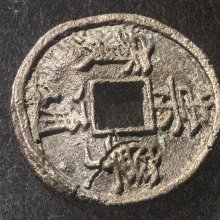Varttaka, Vārttāka: 7 definitions
Introduction:
Varttaka means something in Hinduism, Sanskrit, Marathi. If you want to know the exact meaning, history, etymology or English translation of this term then check out the descriptions on this page. Add your comment or reference to a book if you want to contribute to this summary article.
Images (photo gallery)
(+2 more images available)
In Hinduism
Ayurveda (science of life)
Agriculture (Krishi) and Vrikshayurveda (study of Plant life)
Source: Shodhganga: Drumavichitrikarnam—Plant mutagenesis in ancient IndiaVārttāka (वार्त्ताक) is identified with Solanum melongena, according to the Vṛkṣāyurveda by Sūrapāla (1000 CE): an encyclopedic work dealing with the study of trees and the principles of ancient Indian agriculture.—Accordingly, “A small hole should be bored in a tender Benincasa hispida, and the seed of the Azadirachta indica, profusely smeared with honey and melted butter should be dropped in through the hole. After the gourd is fully ripe the seed should be carefully extracted and sown. It then produces plant which ample wealth in the form of Solanum melongena [e.g., Vārttāka] of huge size”.
Unclassified Ayurveda definitions
Source: Wisdom Library: Āyurveda and botanyVārttāka (वार्त्ताक) is another name (synonym) for Vārttākī, which is the Sanskrit word for Solanum melongena (eggplant), a plant from the Solanaceae family. This synonym was identified by Narahari in his 13th-century Rājanighaṇṭu (verses 7.194-195), which is an Ayurvedic medicinal thesaurus.
Vārttāka can also be spelled as Vārtāka, which is another commonly used Sanskrit word referring to the same Solanum melongena.

Āyurveda (आयुर्वेद, ayurveda) is a branch of Indian science dealing with medicine, herbalism, taxology, anatomy, surgery, alchemy and related topics. Traditional practice of Āyurveda in ancient India dates back to at least the first millenium BC. Literature is commonly written in Sanskrit using various poetic metres.
Languages of India and abroad
Marathi-English dictionary
Source: DDSA: The Molesworth Marathi and English Dictionaryvarttaka (वर्त्तक).—m (varttaṇēṃ) An officer of a town or village. A sort of Bailiff or Warden. 2 varttakī tapakīra f n signifies (because formerly there was at Poona a clever snuffmaker bearing the cognomen of varttaka) superexcellent snuff.
Marathi is an Indo-European language having over 70 million native speakers people in (predominantly) Maharashtra India. Marathi, like many other Indo-Aryan languages, evolved from early forms of Prakrit, which itself is a subset of Sanskrit, one of the most ancient languages of the world.
Sanskrit dictionary
Source: Cologne Digital Sanskrit Dictionaries: Shabda-Sagara Sanskrit-English DictionaryVarttaka (वर्त्तक).—mfn.
(-kaḥ-kā-kaṃ) Who is or abides, exists, lives, &c. mf. (-kaḥ-kā or kī) 1. A sort of quail, (Perdix olivacea.) 2. A horse’s hoof. n.
(-kaṃ) A sort of mixed or bell-metal, commonly Vidari. E. vṛt to be, ṇvul aff.
--- OR ---
Vārttāka (वार्त्ताक).—m.
(-kaḥ) The egg-plant: see vārttāku, the u being changed to a .
Source: Cologne Digital Sanskrit Dictionaries: Monier-Williams Sanskrit-English DictionaryVārttāka (वार्त्ताक):—[from vārtaka] m. (rarely f(ī). ; [probably] [from] vṛtta, round) the egg-plant, Solanum Melongena and another species (n. its fruit), [Harivaṃśa; Suśruta; Mārkaṇḍeya-purāṇa]
Source: Cologne Digital Sanskrit Dictionaries: Yates Sanskrit-English Dictionary1) Varttaka (वर्त्तक):—[(kaḥ-kā-kaṃ)] 1. m. f. A sort of quail; horse’s hoof. n. Mixed or bell metal. a. Extant, living.
2) Vārttāka (वार्त्ताक):—(kaḥ) 1. m. The egg-plant.
[Sanskrit to German]
Sanskrit, also spelled संस्कृतम् (saṃskṛtam), is an ancient language of India commonly seen as the grandmother of the Indo-European language family (even English!). Closely allied with Prakrit and Pali, Sanskrit is more exhaustive in both grammar and terms and has the most extensive collection of literature in the world, greatly surpassing its sister-languages Greek and Latin.
See also (Relevant definitions)
Starts with: Varttakan, Varttakarman, Varttakarmman, Varttakashakata, Varttakashakina.
Ends with: Anuvarttaka, Apavarttaka, Apravarttaka, Apunaravarttaka, Asamavarttaka, Avarttaka, Brahmavaivartaka, Kaivarttaka, Nirvarttaka, Nivarttaka, Parivarttaka, Pravarttaka, Samvarttaka, Udvarttaka, Vyavarttaka.
Full-text: Varttakin, Varttaki, Kuttuvarttakam, Varttakashakata, Varttakashakina, Parivarttaka, Samvarttaka, Pravarttaka, Paravarttikam, Brihati, Vartaka, Varttika, Ashtadhikara, Vartta.
Relevant text
Search found 3 books and stories containing Varttaka, Vārttāka; (plurals include: Varttakas, Vārttākas). You can also click to the full overview containing English textual excerpts. Below are direct links for the most relevant articles:
Kavyamimamsa of Rajasekhara (Study) (by Debabrata Barai)
Part 3.9 - Varieties of Kāvya-pāka < [Chapter 5 - Analyasis and Interpretations of the Kāvyamīmāṃsā]
Puranic encyclopaedia (by Vettam Mani)
Expiatory Rites in Keralite Tantra (by T. S. Syamkumar)
1.3. Expiatory Rites in Īśānaśivagurudevapaddhati < [Chapter 3 - Expiatory Rites in Kerala Tantric Ritual Manuals]





